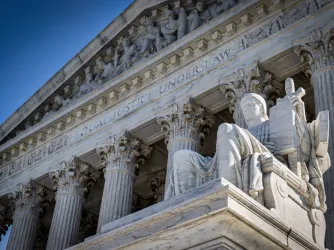Table of Contents
As free speech controversies mount, Indiana University faculty pitch vote of no confidence in university leadership

University of College / Shutterstock.com
UPDATED (April 17, 2024): Last night, during a special meeting of the Indiana University Bloomington Faculty Council, hundreds of faculty overwhelmingly passed votes of no confidence in IU President Pamela Whitten, Provost Rahul Shrivastav, and Vice Provost for Faculty and Academic Affairs Carrie Docherty.
Concerns over free speech and academic freedom are prompting Indiana University faculty to consider a vote of no confidence this month against IU’s most senior leadership. The Indiana Daily Student reported faculty will meet April 16 to consider a petition calling for a vote of no confidence in IU President Pamela Whitten and two other high-level administrators.
The petition cites encroachments on academic freedom and shared governance, noting examples that raised concerns about viewpoint discrimination like the university’s sanctioning of associate professor Abdulkader Sinno for an alleged violation of university room reservation policies and its cancellation of an art exhibit featuring a prominent Palestinian artist at IU’s campus museum.
These incidents add to IU’s years-long questionable track record on free speech issues that has placed the university on our radar and prompted repeated — but often ignored — correspondence from FIRE. Most recently, at IU’s request, Indiana University Hillel postponed a March 26 campus event featuring prominent pro-Israel activist and Hamas critic Mosab Hassan Yousef due to what the university dubbed “credible security information.”

Indiana University School of Medicine continues to disregard First Amendment, smuggles ideological commitments into honor code
After ignoring FIRE’s warnings about the threat to academic freedom, Indiana University School of Medicine now appears to require faculty to sign a politicized honor code as part of its training on mitigating bias.
Transparency is vital when a public university curtails expressive rights, and vague security concerns must not serve as pretext for shutting down events on campus. IU said the “credible security information” raised concerns about the safety of the event and its attendees, and Yousef pointed to “serious and credible security issues involving the Muslim community and several White supremacist groups” involving the FBI.
While security threats that implicate potential FBI involvement certainly can warrant total event cancellation, at the very least, the university needs to show its work by publicly demonstrating the threats it received rose to such an extraordinary level of severity that canceling was the only way to assure the safety of would-be participants and attendees. After all, when universities anticipate substantial disruptions, they must respond not by canceling or hamstringing the event, but rather with “bona fide efforts” to protect expressive rights “by other, less restrictive means.”
It was clear in the Yousef event’s leadup that it was very likely to draw significant attention and controversy, as a student group advertised a protest that would have bused in off-campus protesters to demonstrate in front of the venue. And Yousef, also known as the “Son of Hamas,” has drawn significant controversy for his criticism of Islam and the Muslim community. Such high-profile and potentially disruptive protests should have prompted the university to bolster security for the event — and to postpone it only as a last resort.
Yet IU’s track record offers reason to doubt it approached the event with the First Amendment top-of-mind.
In January, for example, administrators sanctioned associate professor Abdulkader Sinno, who allegedly violated a minor university procedure for reserving on-campus rooms when he scheduled an event featuring an Israeli-American critic of Israel. A banishment from teaching until the fall semeseter amounted to severe discipline for what appeared to be a relatively minor infraction, rendering it seemingly pretextual in light of Sinno’s pro-Palestinian advocacy.
That same month, IU canceled an exhibit at the university’s Eskenazi Museum of Art featuring Samia Halaby, a Palestinian artist, ostensibly due to concerns about guaranteeing “the integrity of the exhibit.” But the university also cited complaints by museum staff about Halaby’s activism, suggesting they nixed the exhibit because of Halaby’s support for Palestinians. Shortly after that incident, FIRE requested records about it under state open records law — two months later, we’re still waiting to receive them.

FIRE seeks Indiana University records on cancellation of pro-Palestinian art exhibit
Indiana University has refused to be transparent about alleged ‘security concerns’ that prompted cancellation of Palestinian painter Samia Halaby’s exhibit.
And the university’s misdeeds on speech aren’t relegated to expression relating to the Israeli-Palestinian conflict. For example, in early 2023, the university stonewalled in response to FIRE’s concern about its requirement that faculty members pledge their “views, beliefs, actions, and inactions do not, intentionally or unintentionally, perpetuate . . . inequity” in healthcare, potentially forcing faculty to promise not to engage in wrongthink that contradicts university-approved orthodoxy. That came after the university began a three-year plan to phase in a requirement that faculty seeking tenure and promotion “show effort toward advancing DEI” in either their teaching or their extramural research and work.
In late 2022, the university consistently delayed and denied public records requests from student journalists, displaying disregard for transparency. A little earlier that year, when several faculty members emailed a faculty listserv raising personal concerns about a proposed state abortion bill, an administrator chided them and claimed they could face discipline because the administration did not approve their message. FIRE wrote IU to urge it not to punish faculty for their speech about abortion, but the university did not respond substantively to our concerns.
Some at IU seem to recognize the need to protect free expression and academic freedom. In a measured victory for academic freedom, the university’s board of trustees endorsed President Whitten’s proposal to keep IU as the home of the Kinsey Institute — famous for its research about sexuality and relationships — while complying with a law that prohibits the use of taxpayer dollars to fund it. And both pro-Israeli and pro-Palestinian student groups recently held events on campus despite the university’s latest actions.
IU currently ranks a disappointing 225 out of 248 schools in FIRE’s 2024 College Free Speech Rankings. Until it recognizes how its actions chill speech on campus, it risks finding itself atop of a much more ignominious list.
FIRE’s 2025 “10 Worst Censors” list won’t be finalized for at least another nine months, but IU is already shaping up to be a contender for the annual (dis)honor.
- Faculty Rights
- Free Speech
- Student Rights
- Indiana University
- Indiana University: University Violates Public Records Laws with Massive Delays, Illegal Denials
- Indiana University: University Threatens to Punish Faculty Leaders for Email about Proposed Abortion Bill
- Indiana University Bloomington: SexFest Event Canceled After Video Causes Controversy
- Indiana University: Public Records Request for Professor’s Emails, Accusation of Policy Violations After Writing About Presidential Search
- Indiana University: University Police Launch Investigation Into Anonymous Offensive Posts on Greek Life Website
- Indiana University: University Cancels Art Exhibit Featuring Palestinian Artist
Recent Articles
Get the latest free speech news and analysis from FIRE.

The federal charges against Don Lemon raise serious concerns for press freedom

The American people fact-checked their government

California prohibits its teachers from talking about a student's gender identity to their parents. That raises First Amendment concerns.


